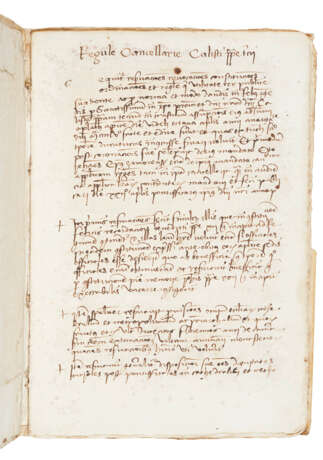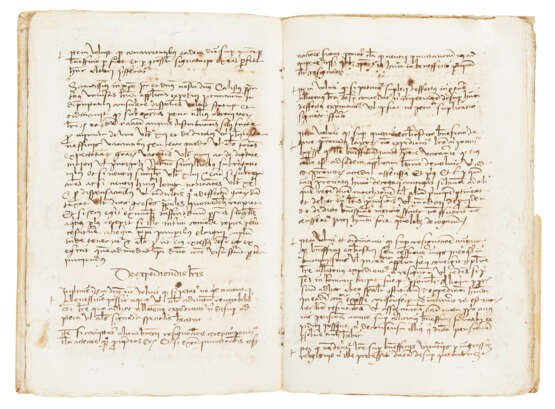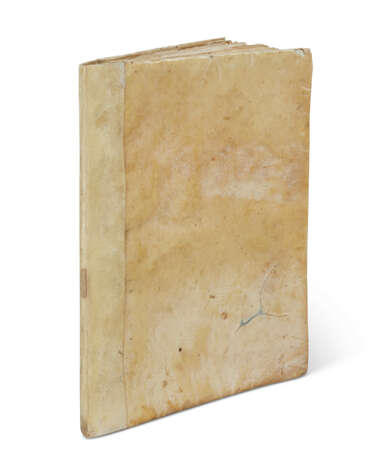ID 1349687
Lot 19 | Pope Callixtus III (1378-1458)
Estimate value
£ 2 500 – 3 000
Regule Cancellarie of Pope Callixtus III, in Latin, manuscript on paper [Spain, Barcelona, end of the 15th century]
A rare, contemporary manuscript of the chancery rules and regulations issued by Alfonso de Borgia on his election as Pope Callixtus III in 1455.
225 x 155mm. 16 leaves, the text written in a Spanish chancery hand, probably by a Catalan scribe, the initial opening the text left blank with instructions to be supplied (light marginal foxing). Contemporary vellum binding.
Provenance:
The explicit is dated 22 April 1455: 'Lecte et publicate fuerunt prescripte regule in Audientia apostolicarum litterarum contradictarum, die vicesima secunda mensis aprilis anno domini millesimo quadringentesimo quinquagesimo quinto, pontificatus sanctissimi in Christo patris et domini nostri dominie Calixti pape tertii anno primo'. The manuscript dates to the final decades of the 15th century.
Content: 'Regule Cancellarie Calisti Pape tertii', the text beginning: 'Sequuntur reservationes, revocationes, constitutiones, ordinationes et regule que utilitate rei publice suadente ac pro norma et modo dandis in rebus agendis per sanctissimum in Christo patrem et dominum nostrum dominum Calistum papam tercio [...]'.
Throughout the Middle Ages and into the Renaissance the official letters of the popes were deposited in the papal archives either in the original or by copy. They are still in existence, and almost complete in number, from the time of Innocent III (1198-1216). Papal letters would be incorporated, as their legal nature required, into the Corpus Iuris Canonici, or would be found in the formularies, many of which appeared unofficially in the Middle Ages. These letters were forwarded by the chancery, for whose use the chancery rules, 'Regule Cancellarie', were drawn up: these rules governed the execution and dispatch of the papal letters.
Alfonso de Borgia was born in La Torreta, in the Kingdom of Valencia, in 1378. He was Bishop of Valencia by 1429 and Cardinal by 1444. He was elected to the Papacy as a compromise candidate in 1455: the present manuscript is a rare contemporary witness to the 106 papal chancery rules and regulations issued at the start of his Pontificate on 8 April 1455. The full text of these ordinances can be found on https://www.uni-marburg.de/de/fb06/mag/institut/prof-dr-andreas-meyer/kanzleiregeldateien/calixt3e.pdf.
| Place of origin: | Europe, Spain |
|---|---|
| Auction house category: | Medieval & renaissance manuscripts, Books and manuscripts |
| Place of origin: | Europe, Spain |
|---|---|
| Auction house category: | Medieval & renaissance manuscripts, Books and manuscripts |
| Address of auction |
CHRISTIE'S 8 King Street, St. James's SW1Y 6QT London United Kingdom | |
|---|---|---|
| Preview |
| |
| Phone | +44 (0)20 7839 9060 | |
| Buyer Premium | see on Website | |
| Conditions of purchase | Conditions of purchase |





